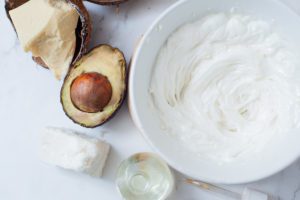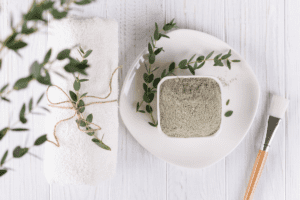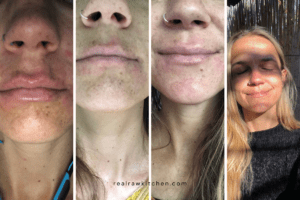When you’re dealing with eczema or perioral dermatitis, it can seem like radiant skin is a far-fetched fairytale.
But a little bit of calendula oil might help with that.
Making calendula oil was my very first step in healing my perioral dermatitis, after discovering all of the major calendula benefits for skin.
Whether you have sensitive skin (like me!) or aging skin (uh, also like me), or any kind of inflammatory skin conditions (also me 😭) you’ll find the medicinal properties of the calendula plant to be quite impressive. In fact, all skin types can benefit from calendula oil.
Here’s everything you need to know about the calendula benefits for skin.
What is Calendula?
Calendula, also known as pot marigold plant, is not only beautiful but also packed with healing properties. This bright yellow and orange flower, which resembles the sun, is known for its antibacterial and anti-inflammatory properties. Its scientific name is Calendula officinalis, and it has been used medicinally for centuries to treat a variety of ailments.
Calendula is native to the Mediterranean region but is now grown worldwide due to its popularity in natural remedies. It’s a versatile plant that can be used in many forms, but one of the most common and potent is calendula oil.
How is Calendula Oil Extracted?
Calendula oil is created through a simple infusion process. Dried calendula flowers are placed in a sterilized glass jar, which is then filled with a carrier oil such as olive oil, almond oil, or for sensitive skin, either jojoba oil or argan oil. The jar is sealed and left in a cool, dry place or in the sun for a solar-infused oil for about 4-6 weeks, with occasional shaking to aid the infusion process.
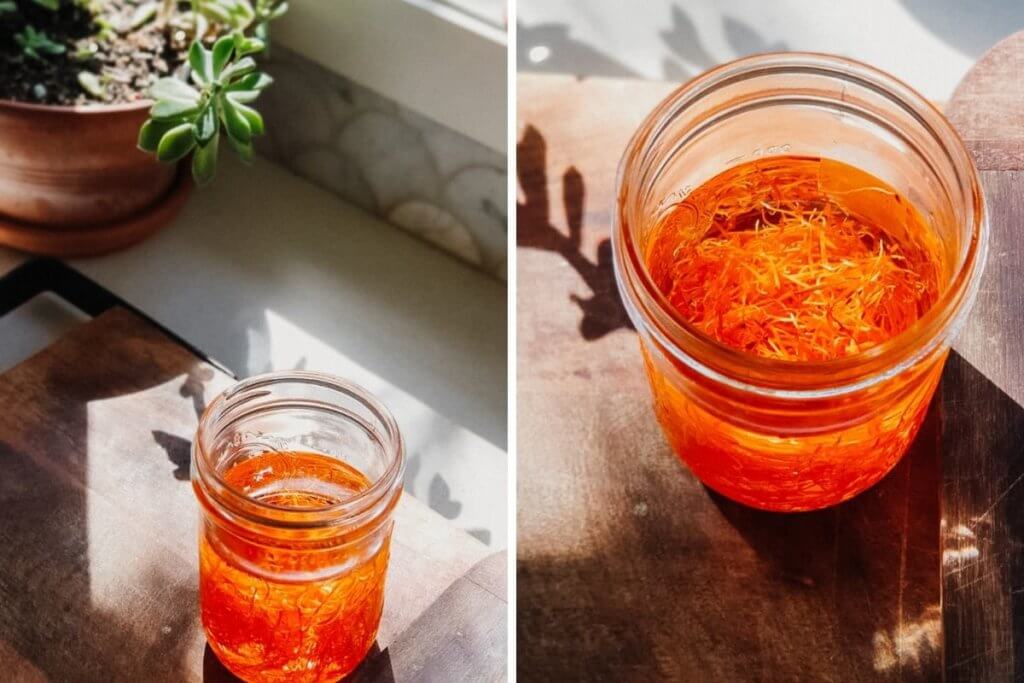

Once the oil is infused, the calendula petals are strained out, and the oil is transferred to a new jar for storage. Additives like vitamin E or lavender essential oil can be added to increase shelf life and add additional benefits.
Benefits of Calendula and Skin Health
Calendula contains several potent active compounds, including flavonoids, triterpenes, and carotenoids, which contribute to its therapeutic effects. Here’s how these properties benefit your skin:
- Antibacterial Properties: Calendula has been shown to have strong antibacterial properties, which can help ward off skin infections. This is particularly beneficial for those with acne-prone skin, as it can help reduce breakouts and keep the skin clean and clear.
- Anti-inflammatory Properties: One of the most well-known benefits of calendula is its ability to soothe and reduce inflammation. This makes it an excellent choice for those with sensitive or irritated skin. It can help to calm redness, swelling, and itching, making it a go-to for conditions like eczema and dermatitis.
- Anti-fungal Properties: Calendula also has anti-fungal properties, which can be beneficial for treating conditions like athlete’s foot or ringworm. It can also help to prevent fungal infections from developing in the first place.
- Antioxidant Properties: Calendula is rich in antioxidants like carotenoids and flavonoids, which protect the skin from environmental stressors and premature aging. These antioxidants also promote skin healing and regeneration, reducing scars and blemishes.


Active Antioxidants in Calendula
Free radicals are unstable atoms that can damage cells, causing illness and aging. They are linked to aging and a host of diseases, but little is known about their role in human health, or how to prevent them from making people sick. In the context of skin health, free radicals can cause oxidative stress, leading to premature aging, wrinkles, and even skin cancer.
Calendula contains several potent antioxidants, including flavonoids and polyphenols, that can help neutralize free radicals and reduce oxidative stress.
- Triterpenoids: Triterpenoids are a type of compound found in calendula that have been shown to have anti-inflammatory, antiviral, and antitumor properties. They play a crucial role in protecting the skin from damage and promoting healing.
- Flavonoids: Flavonoids are powerful antioxidants that protect the skin from free radicals, which are harmful molecules that can cause damage to the skin. They also have anti-inflammatory properties, which can help reduce swelling and redness.
- Carotenoids: Carotenoids are pigments found in calendula that are rich in antioxidants. They help protect the skin from damage caused by the sun and environmental pollutants.
- Saponins: Saponins are compounds that have antimicrobial properties, which can help protect the skin from harmful bacteria and other microorganisms.
- Polysaccharides: Polysaccharides are sugars that help hydrate the skin and promote wound healing.
In fact, calendula’s antioxidant properties are so powerful that they can be used for sun protection. A study published in the Journal of Ethnopharmacology found that calendula extract demonstrated a dose-dependent effect against different radicals, indicating its potential use in preventing UV irradiation-induced oxidative stress in skin. The study also found that oral treatment with calendula extract maintained glutathione (GSH) levels close to non-irradiated control mice, suggesting its protective effect against oxidative stress.
The Science Behind Calendula Skin Benefits
These active components in calendula work together to promote skin health in several ways. The antioxidants protect the skin from damage caused by environmental factors such as sun exposure and pollution. They also help to reduce inflammation, which can lead to skin problems such as acne and eczema.
In addition to their protective properties, these components also promote healing.
Several studies have backed up these claims about the calendula plant’s benefits for skin health. For example, a study found that calendula extract helped to maintain levels of glutathione, a powerful antioxidant, in the skin of mice exposed to UVB radiation. This suggests that calendula could help to protect the skin from the damaging effects of sun exposure.
Another study found that a mouthwash containing calendula extract helped to heal wounds and prevent radiation-induced mucositis, a painful inflammation and ulceration of the mucous membranes, in patients with head and neck cancers. This suggests that calendula could help to promote healing in damaged skin. A separate clinical trial supports this finding. The trial found that using calendula ointment significantly increased the speed of wound healing following a cesarean section. This suggests that calendula could be beneficial for healing minor cuts, scrapes, and burns on the skin.
Another study found that calendula has anti-inflammatory and antibacterial activities, as well as angiogenic and fibroblastic properties, which positively affect the inflammatory and proliferative phases of the healing process. This supports the use of calendula for reducing inflammation and promoting skin healing.
A review on the use of topical calendula for the prevention and treatment of radiotherapy-induced skin reactions also found positive effects. This suggests that calendula could be beneficial for those undergoing radiation therapy, which often causes skin reactions.
Calendula for Different Skin Conditions
Calendula is a powerful plant with numerous benefits for skin health. It’s been proven time and time again, so it’s often the first place people start their skin healing journey. Whether you’re dealing with acne, skin inflammation, fungal infections, or just want to promote healthy skin, calendula is definitely worth considering.
Calendula for Dry and Cracked Skin
Dry and cracked skin can be a real pain, and not just in the literal sense. It can make your skin feel uncomfortable and look less than its best. But don’t worry, calendula comes to the rescue. Calendula oil is rich in fatty acids and plant sterols that provide hydration and plumpness to the skin. It helps to restore the skin’s natural barrier, preventing moisture loss and keeping your skin hydrated.
According to a study published in Evidence-Based Complementary and Alternative Medicine, Calendula officinalis, the plant from which calendula oil is derived, has been used for centuries for its wound healing and anti-inflammatory properties. The study found that calendula has anti-inflammatory and antibacterial activities, as well as angiogenic (formation of new blood vessels) and fibroblastic (formation of fibrous tissue) properties, which positively affect the inflammatory and proliferative phases of the healing process.
Calendula’s Benefits for Conditions like Eczema and Psoriasis
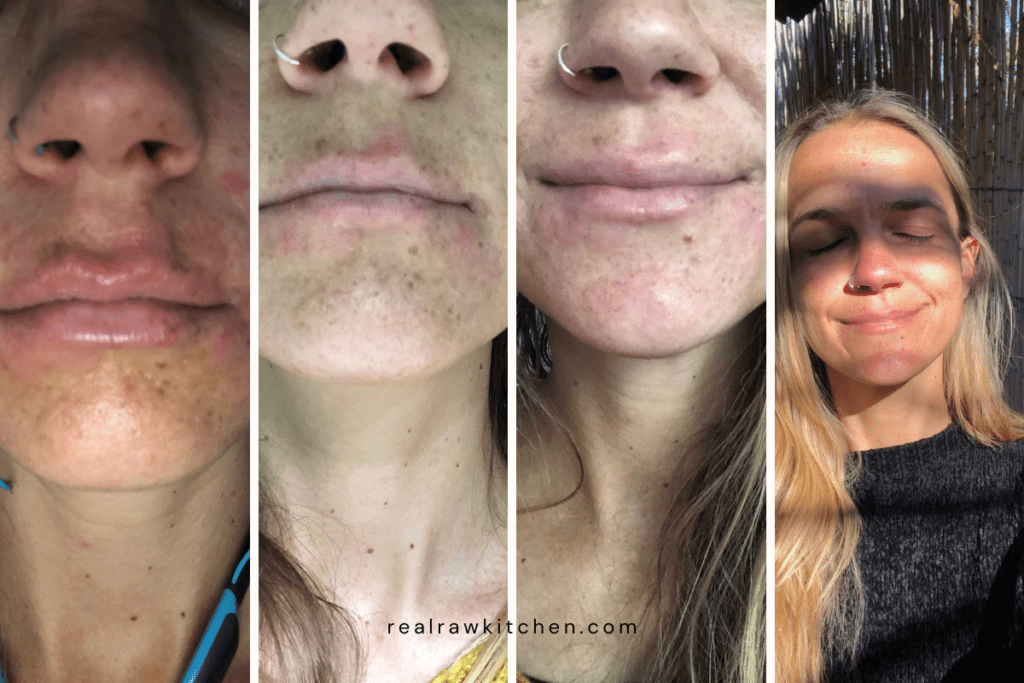

Eczema and psoriasis are chronic skin conditions that cause inflammation, redness, and scaling. They can be quite challenging to manage, but calendula may offer some relief. Thanks to its anti-inflammatory properties, calendula soothes the skin, reduces redness, and promotes wound healing.
In a study published in Evidence-Based Complementary and Alternative Medicine, the calendula flower was found to have anti-inflammatory and wound-healing properties. It was shown to have a positive effect on the inflammatory and proliferative phases of the healing process, which could be beneficial for conditions like eczema and psoriasis.
Calendula’s Role in Skin Hydration and Cell Regrowth
Hydration is key to maintaining healthy skin. It helps to keep your skin soft, smooth, and glowing. Calendula can play a significant role in skin hydration. As mentioned earlier, it helps to restore the skin’s natural barrier, preventing moisture loss. This helps to keep your skin hydrated and healthy.
But that’s not all. Calendula also plays a role in cell regrowth. It’s rich in antioxidants, including flavonoids and carotenoids, which help to protect your skin from damage. These antioxidants also promote cell turnover, helping your skin to regenerate and stay fresh and youthful.
In a review published in Skin Pharmacology and Physiology, botanical extracts, including calendula, were found to be beneficial for dry skin. They were shown to improve skin hydration and barrier function, and also have anti-inflammatory effects.
So, whether you’re dealing with dry and cracked skin, conditions like eczema and psoriasis, or just want to keep your skin hydrated and promote cell regrowth, calendula could be a great addition to your skincare routine.
As always, remember to do a patch test before trying any new skincare product, and consult with a healthcare professional if you have any concerns.
How to Use Calendula for Skin
The calendula plant is super easy to grow right in vegetable gardens. Plus, they attract pollinators with their bright orange petals. That’s what I did when I was living in Australia and made my own calendula oil, which I still use to this day. Here are some tips on how to incorporate calendula into your skincare routine:
- Calendula Oil: Calendula oil is a fantastic way to get the benefits of calendula directly on your skin. You can apply a few drops of the oil directly to your skin or mix it with your favorite moisturizer. For a DIY approach, check out my guide on how to make your own calendula oil.
- Calendula Creams and Lotions: Many skincare products contain calendula because of its soothing properties. Look for creams and lotions that list calendula as one of the main ingredients. Apply these products as you would any other cream or lotion.
- Calendula Infused Products: You can also infuse calendula into your existing skincare products. Check out my guide on how to infuse herbs in oil for more information.
- Calendula Tea: Calendula tea can be used as a soothing facial rinse. Brew a strong cup of calendula tea, let it cool, and then use it to rinse your face after cleansing.
Here are some highly rated and reliable calendula products on Amazon:
- Weleda Skin Food: This deep-penetrating cream is perfect for dry and rough skin. It’s formulated with plant extracts, including calendula, to nourish your skin.
- Eminence Linden Calendula Treatment: I looooove Eminence products; this brand is what inspired me to start making my own skincare products at home! They’ve got this calendula cream made specifically for dry skin. I 10/10 recommend.
Remember, everyone’s skin is different, so what works for one person might not work for another. It’s always a good idea to patch test new products to make sure they don’t irritate your skin. And, as always, consult with a healthcare provider or dermatologist if you have any concerns about using new products on your skin.
Common Questions About Calendula
Does calendula remove dark spots?
Calendula is known for its skin healing properties. While it may not directly remove dark spots, it can help improve your skin’s overall appearance. It’s rich in antioxidants that protect your skin against damage from free radicals, which can contribute to dark spots. However, more research is needed to confirm calendula’s effectiveness in dark spot removal.
Does calendula dry out skin?
No, calendula does not dry out the skin. In fact, it’s quite the opposite. Calendula is often used in skincare products because of its hydrating properties. It’s known to be gentle on the skin and can help soothe dry or irritated skin. It’s also used in creams and lotions to provide moisture and hydration to the skin.
Is calendula oil good for your face?
Yes, calendula oil is beneficial for your face. It’s known for its anti-inflammatory, antibacterial, and related healing properties. These properties make it a great natural remedy for a variety of skin conditions. For instance, it can help soothe skin irritations, reduce acne, and promote skin tightness, which is beneficial for skin health and anti-aging. A study has shown that applying calendula oil can positively impact the inflammatory and proliferative phases of the healing process.
Is calendula good for aging skin?
Absolutely! Calendula is packed with antioxidants that protect your skin from environmental stressors and slow down the aging process. It also promotes skin tightness and improves hydration, which can help reduce the appearance of wrinkles and fine lines. Furthermore, a study has shown that calendula has the potential to enhance the healing process, which can be beneficial for aging skin.


